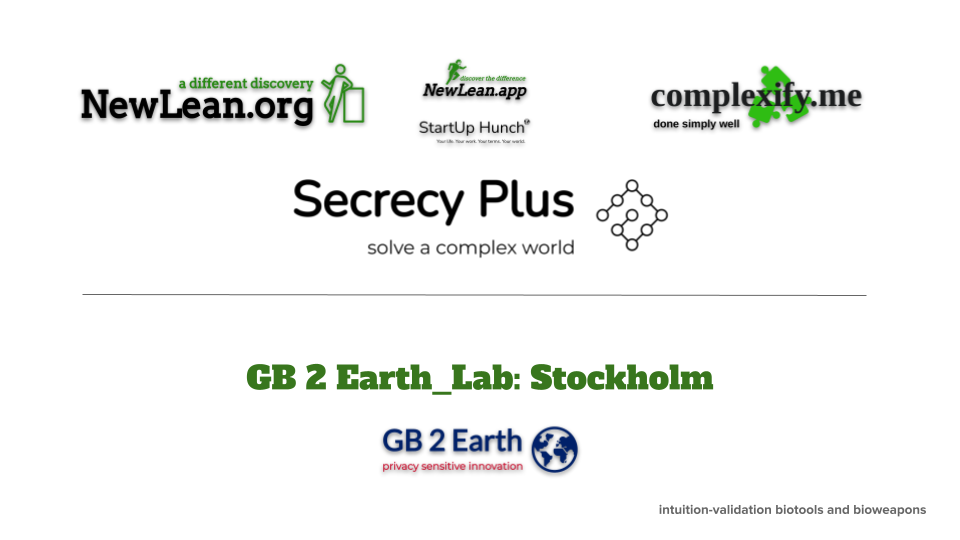Where is tech’s thirst for the new?
https://gb2earth.com/cl-bio | #intuitionvalidation #biotools and #bioweapons
Some thoughts this evening on two concept areas that I've just coined for myself, though they may already exist for others
These two areas are #techprimacy / #techprimacists and #problemprimacy / #problemprimacists.
Background
One thing I learned from my #criminaljustice MA in 2017 was from my personal tutor of the time.
As a progressive academic it was her job, primarily, as she seemed to see it, to ask the right questions and identify the key problems of the society she wished to improve and make fairer.
It wasn't, however, quite overtly, quite patently, self-admitting fully, her job to provide answers: to deliver or even just shape the framework of possible solutions.
Hitchcock was once said to have mentioned that someone had said to him: "It's all in the script." To which he responded: "Then why make the film?"
I have the same problem, since 2016 at least when I met you in Dublin that evening, but probably, equally, since 2002 and #openofficeorg (and then all the intervening years starting with when they incarcerated me in 2003 for a month and proceeded to drug me ever since — for being little more than an inconvenient nonconformist!), for here we’re talking in respect of technologists.
Hitchcock with scriptwriters; me, with technologists.
I'm currently in email conversations with one such person who has clearly evidenced he is interested in applying tech solutions to the real world. He’s a really cool thinker too, but like all of us — like me, too — he has his blinkers.
And so he is interested in solutions for the real world, but his way of applying them is limiting him.
IMHO.
Whereas mine doesn't limit me in the same ways. Though it may in others, of course.
And therein why I’ve been thinking all this time of big problems we must solve, and he is driven as soon as he sees them to knock them back as being impossible ideas.
His processes are these:
He finds technologies and, then, doesn't it's true build fast and break quickly … quite the opposite, yes, it's very true, so all good here ... and then to his credit too, on finding technologies of hugely engaging kinds he will spend a considerable time, academically perhaps too, working out how to solve problems he sees with the deep knowledge he has acquired of such tech landscapes.
But he's still what we could call a #techprimacist. It's the tech first, and then let's see how we can do good. Not like #siliconvalley, thankfully; but the same set of priorities, for sure.
So this is one way. But it's only one way. Isn’t it?
Because another way is my way.
My way is my personal tutor's way from 2017 and the #criminaljustice MA: carefully evidence the problems and challenges, but not step out of your role too eagerly.
Or then again, how about seeing it Hitchcock's way? Make the film but never do the scriptwriter’s job. Never overstep the roles and responsibilities, if you can at all avoid it ...
Where my emailer and I now find ourselves
Re the current email threads flying back and forth between the two of us, then, we have got into a dynamic where he sees my slide-decks as slide-decks, whereas I see them as building-blocks and components of my now long-historical, wending-my-way-back-into-the-past version of #vannevarbush's #memex machine:
https://en.wikipedia.org/wiki/Memex
That is, carefully audited — and continually auditable — trails of complex (never complicated) thought that I've now been laying down for decades.
What is this similar to? Well. I'm building a bespoke universe of my own, just as a game designer would. No?
And if it's universally easy to understand in gaming, why not in my own processes of tech's profound repurposing? Why it so hard for such technologists to understand what's going on in my case — but not when we're talking #callofduty?
Why?
What has happened in my case since I met you in 2016 (and possibly since 2002)
Because this is what happens to me:
I believe firmly that we must spend much more time considering the problem than the solution. And we must radically avoid becoming #techprimacists, altogether: rather, we must firmly decide to always be #problemprimacists:
https://newlean.org | if password protected, email me for the password: mil.williams@gb2earth.com
Now, it's true there are degrees and degrees. My email acquaintance doesn't operate in silly #siliconvalley hype mode at all. Not for him the trashing of the #metaverse or the degeneration of #ai, just to chase #bigtech's stupid bucks at the expense of truly removing problems from the lives of real people.
https://nevermeetagain.com/project | a repurposed #metaverse designed to deliver an asynchronous version
Even so, his chosen modus operandi of #techprimacist means that if he can't instinctively, straightforwardly, directly see his way through to a solution for a problem I pose — both of us, it's true, acting in good faith I'm sure — he will too quickly (even if much more slowly than #siliconvalley) conclude that:
because it's never been done in human history before ... well ... it can't be ...
and this, primarily, he would seem to say, being as a result of the fact that a) the tech doesn't exist and b) it would be a waste of time attempting to develop,
mostly because human nature is ... well ... inevitably, naturally unchangeable.
All this happens, to my mind, because his embedded, and even sometimes encrusted, #techprimacy seems to dismiss pretty speedily the practical implementation of my ideas, most of them it seems, and increasingly so, being ideas that he's unwilling to deepen the conversations around what they might really be saying, and even what they might really be.
Because you don't deepen anything you think can't ever be done. Now do you?
Inevitably, this means in this "progressive academic" and/or "scriptwriter" function to tech — ie he, the technologist and problem-solver and me, the imagineer and problem-poser — he neither fulfils his role well nor gives me the space to fulfil mine at all.
As a #problemprimacist, you see, I strongly feel we should never use tech's current absences and lacks of as tools and means to almost gleefully rebut the significance and relevance of a problem some of us really do want to solve.
My rationale being …
This is my thinking in less than five sentences:
Surely if we can say the problem has never been solved, MORE reason to consider it not less — and really really really, NO reason whatsoever to counter the problem's importance by (gleefully) jumping in, as dramatically as we can, and proclaiming it's unsolvable … ergo, a waste of time.
And then — FFS! — if we can ALSO say the tech doesn't seem to exist, on top of the problem not having been solved yet, WHY does this give us even more right to diminish further the value of resolving our problem as initially identified and laid out? If the problem needs solving — given a perfect world, say — and the tech isn't available as yet, are these really reasons not to proceed. Wouldn't it surely be quite the opposite?
In conclusion
Where IS tech's — where is our wider — thirst for the truly new?
Where did it go?
Why do we prefer to tweak and sell it as disruptive disturbances in the space/time continuum of humanity this 21st century, instead of search and bury deeply into life, the universe, and everything in it — because we don’t know it yet?
Why this fear? Why has it arisen? And who is out there to help us?




